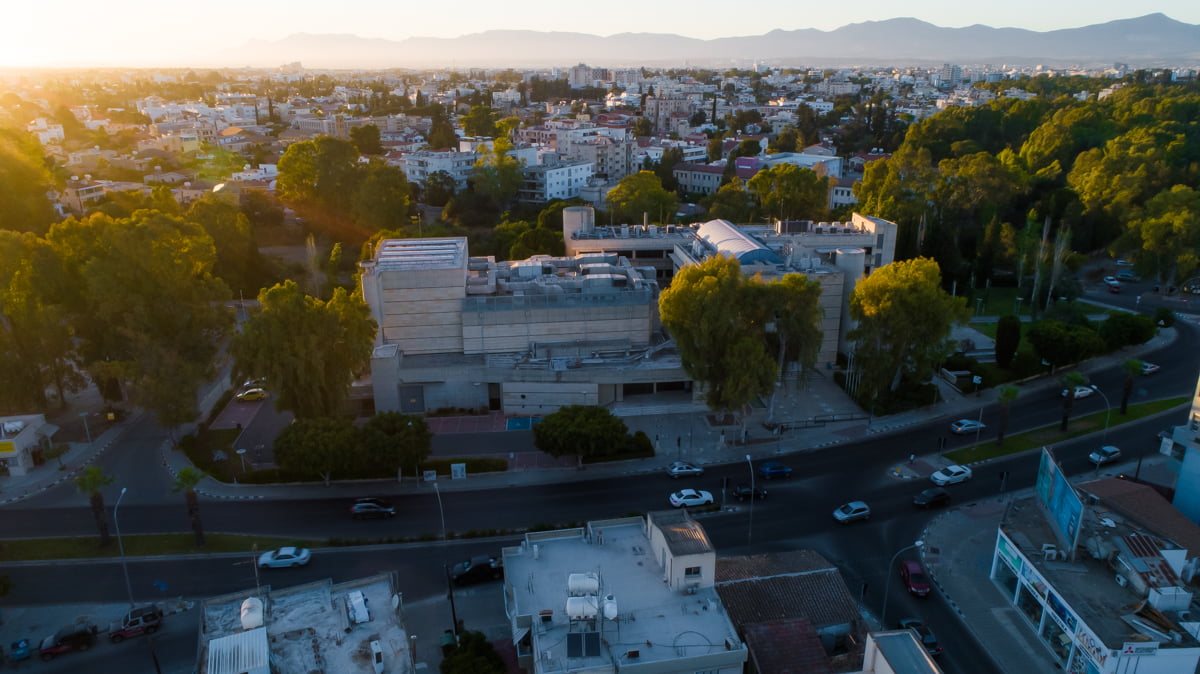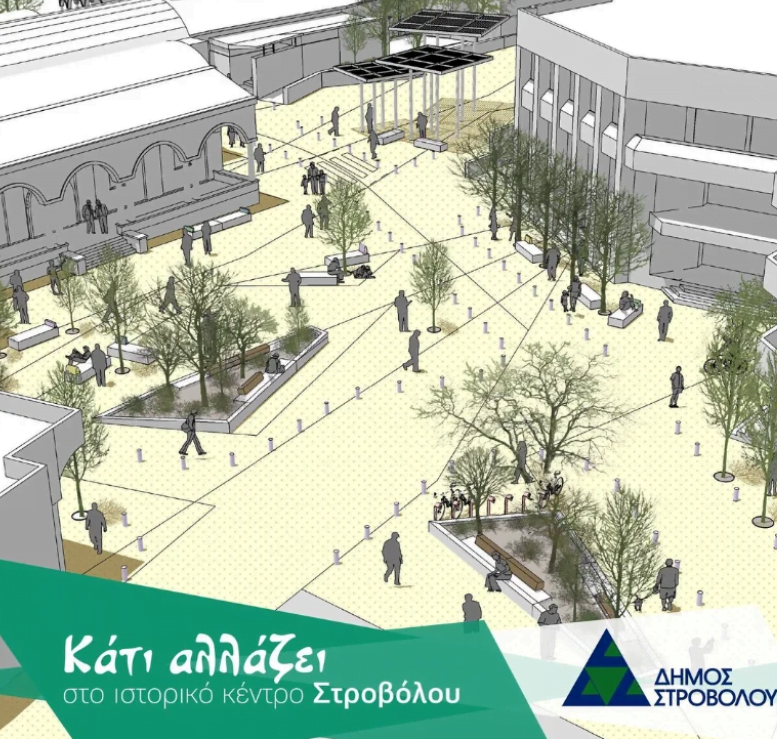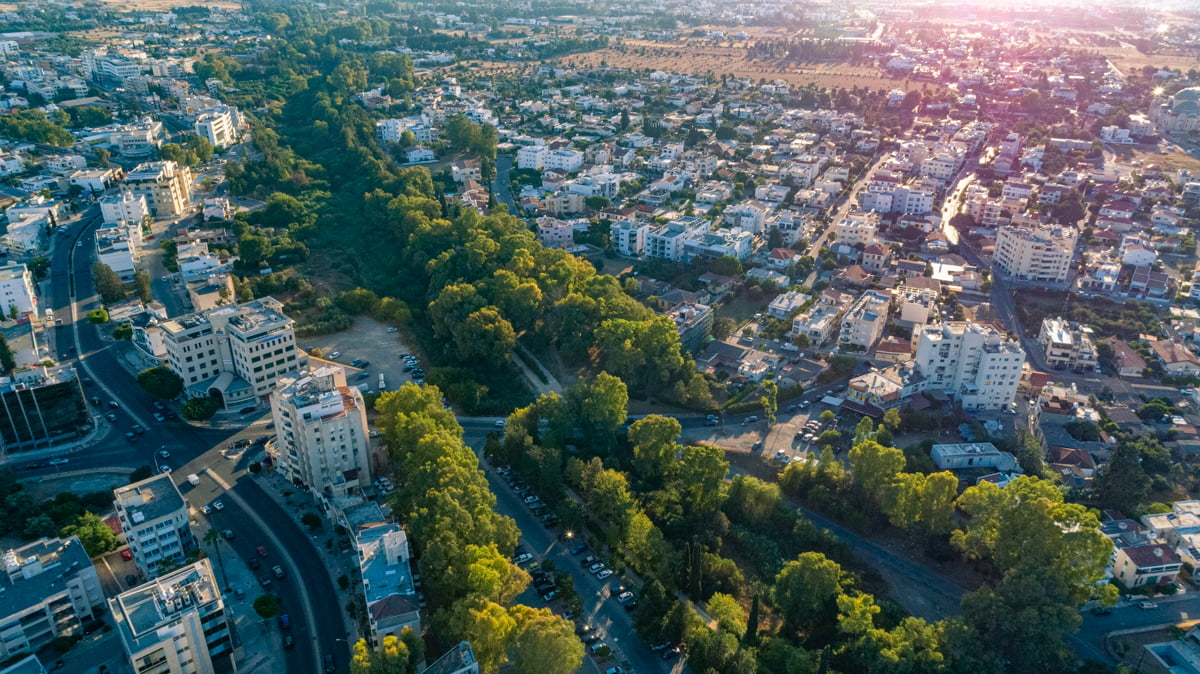Strovolos Strides Out
Established in 1986 and with a population of over 70,000 inhabitants, the municipality of Strovolos is the second largest municipality in Cyprus after Limassol. But, aside from its facts and figures, Strovolos is not just your average city. Spanning an impressive 25km², it harbours grand ambitions for sustainable mobility that surpass its physical boundaries.
An interview with Andreas Papacharalambous, elaborated by Isobel Duxfield.
Strovolos’ environmental agenda has not only captivated the nation but has gained global recognition, as it spearheads an array of remarkable transformations. Urban spaces have undergone a magnificent metamorphosis, while purpose-designed cycling and tram corridors are expected to seamlessly weave through the cityscape. And as if that were not enough, Strovolos has even birthed a pioneering Digital Academy, envisioning a future of mobility that fuses innovation and imagination.

Andreas Papacharalambous, Mayor, Municipality of Strovolos
Curiosity piqued, we sought out Strovolos' Mayor, Andreas Papacharalambous, to unravel the secrets behind their audacious plans and witness their tangible realisation. A seasoned veteran, Mayor Papacharalambous has dedicated years to serving his beloved municipality, having held numerous council positions before ascending to his mayoral role in 2017.
With unwavering dedication, he continues to propel the municipality forward, ushering in an era of progress and prosperity.
POLIS: Strovolos is implementing a Sustainable Energy and Climate Action Plan and a climate neutrality strategy by 2030. Why is this target important to you?
Andreas Papacharalambous: Energy neutrality is highly important for all European cities. There is no planet B, and we can now clearly see that humanity is on the brink of an environmental crisis.
The Municipal Council of Strovolos and I have made sustainability and environmental protection a priority and are working on the completion and implementation of the Climate Neutrality Action Plan by 2030, which aims to reduce greenhouse gas emissions by 15% by 2030.

Strovolos' Dimotiko Theatre. Credit: Municipality of Strovolos
We are planning to promote sustainable mobility through the regeneration of Strovolos’ historical centre, achieving also cityscape guidance and the creation of the Digital Academy, a flagship project which will be also hosted in the historical centre. The Academy is going to be housed in the first energy-neutral and smart public building on the island, to host various activities to help with both digital transformation and social inclusion.
POLIS: What are the key features of this plan? And how does transport feature in this?
Andreas: Strovolos’ Climate Neutrality Action Plan, which we are currently developing, includes eight priority sectors: mobility, built environment, energy, climate change effect mitigation, biodiversity enrichment, recycling and waste management, circular economy, and the development of a local green economy.

An intersection in Strovolos. Credit: Municipality of Strovolos
Transport is key here and we aim to create a low-emissions zone (LEZ) in the historical centre of Strovolos, after the completion of the regeneration project of the entire area. Additionally, we are promoting the creation of electric vehicle charging stations and smart parking, and we are improving and extending bicycle routes and sustainable mobility connectivity in the urban Strovolos area.
Another major project is the further development of Pediaios Linear Park, which stretches along the municipalities of Lakatamia, Strovolos, and Nicosia. We aim to enhance biodiversity, implement climate efficiency measures and enhance and develop more pedestrian and bicycle routes.
POLIS: Strovolos was the first public organisation in Cyprus to receive the Green Offices Award. How has the municipality established itself as a frontrunner in sustainability?
Andreas: Strovolos Municipality has always embraced green initiatives, and collaborating and learning from others is key here. We have long followed European and international good practices and had an open and fruitful relationship with academic institutions, NGOs, civil society, and research organisations.
The Municipality was one of the first organisations in Cyprus to have an ISO quality certification for all its procedures, as well as a firm vision and action plan for implementation.
Its involvement in EU-funded projects has greatly impacted the further development of a sustainable and green vision. We are now capitalising on this tradition and we are happy to enrich it by joining POLIS’ membership.
POLIS: What do you feel the role of strong leadership from local leaders (like yourself) is?
Andreas: A local leader is, first and foremost, a citizen. People need to feel connected to the city and to one another. This is something that I am trying to encourage as a Mayor: to me, it is highly important to have everyone’s participation in decision-making. We all must embrace our city, have a say, and actively participate in making our neighbourhoods better. Even if you have the best vision and action plan as a leader, you cannot implement it without people’s support.
A local example is how Strovolos’ residents voiced their concerns about the redesign of a main city street, Tseriou Avenue. The Municipal Council listened to local concerns, then approached the departments responsible for its redesign and managed to completely alter the concept of the project, providing a more humane and walkable street to the citizens. Such processes are critical in ensuring people feel included in similar actions or infrastructural changes.
POLIS: You have been Mayor since 2017. What have been the major changes in the municipality's approach to sustainability and transport since then?
Andreas: Strovolos Municipality has always been a green municipality and we are capitalising on this tradition. We participate in the Covenant of Mayors and have a Sustainable Energy and Climate Plan for the current decade with various actions.
Additionally, the Municipal Council’s strategic planning has been adapted to correlate with the UN Sustainable Development Goals. We are submitting every action for evaluation, to an external expert and the wider public… By all means, sustainability defines the way Strovolos works.

Strovolos by night. Caption: Municipality of Strovolos
Regarding mobility and transport, unfortunately, local authorities in Cyprus do not have a major role in developing transport policies. This is a responsibility of the Ministry of Transport, which designs and implements policies, in cooperation with local authorities and other stakeholders for the entirety of the Republic of Cyprus. However, Strovolos Municipality, especially as of 2017, has been actively participating in these conversations by promoting ideas and measures that have been suggested by locals.
POLIS: What mobility achievements are you most proud of?
Andreas: For me, it is the development of the cycling routes in Pediaios Linear Park. It is a unique area alongside the Pediaios torrent, which connects the municipalities of Lakatamia, Strovolos and Nicosia. The Linear Park is used for leisure as well as transport: also, commuters can use the bicycle or pedestrian lanes, as well as bicycle hubs and parking facilities available in the Park. We aim to further develop Pediaios Linear Park as well as the cycling routes and overall connections of the Pediaios Linear Park cycling routes with the Agios Dimitrios Park in Strovolos.
POLIS: Southern European cities are taking a bigger and bigger role in sustainable agendas. Do you think these cities’ voices are being heard enough? If not, how do you think they can/ should play a greater role in European decision-making?
Andreas: I think we are off to a good start, as many cities are actively working to make their voices and actions heard. However, there is always room for improvement in the role of Southern European Cities. This can be achieved by increasing their involvement in the European Committee of the Regions, actively participating in EU-funded projects, and engaging with platforms and networks such as POLIS.
POLIS: It is 2030, what does mobility in Strovolos look like?
Andreas: In 2030, our vision for Strovolos is to create a greener, smarter, and healthier city with improved air quality and sustainable transportation options for our citizens. We aim to establish 15-minute routes in specific clusters, increase pedestrian zones, and provide more micromobility options. Additionally, we plan to implement a low emissions zone in the historical city centre.

Illustration of Strovolos' Slow City concept. Credit: Municipality of Strovolos
By the end of the decade, we expect to have completed most of our strategic projects, including the regeneration of the old Strovolos area, the implementation of circular economy principles, and the establishment of smart waste management systems. We also intend to develop new roads and infrastructure, finetuning the Citizens' Digital Academy, and drive digital transformation for a smart city and clean energy initiatives.
We strongly believe that it is crucial to foster a significant cultural and mindset shift among the population, encouraging them to embrace more sustainable and environmentally friendly transportation options.
Click here to read the article in its original format.
About the contributors:
Interviewer: Isobel Duxfield is Communications and Membership Manager at POLIS. She completed her MPhil in Gender Studies at the University of Cambridge where she researched gender and cycling. Isobel manages the SUM4All project and has published academic work on gender and active mobility, and domestic violence prevention.
Interviewee: Andreas Papacharalambous studied at the University of Reading, UK, and completed his postgraduate studies at the London School of Economics in the field of European policy. He has been a municipal councilor, has held the position of Deputy Mayor, and has been Mayor of Strovolos since 2017.
